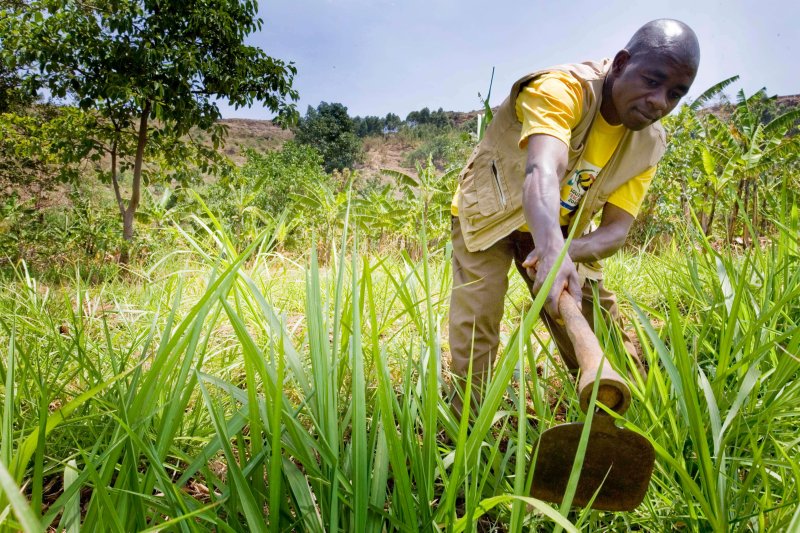“Improved technology, particularly biotechnology, will play a major role if we can become food sufficient,” said Dr. Maxwell Asante Darko, a plant breeder at the Crop Research Institute of the Council for Scientific and Industrial Research (CSIR). “Because there are floods and drought when you don’t expect it, there should be investment in land improvement, fertilizer, machinery, but also investment in varieties so we can develop more high-yielding varieties that are climate smart. With that, we will be able to achieve self-sufficiency faster.”
Evans Okomeng, a farmer and leader of the Graduate Farmers Network, a group of young farmers who have ventured into agriculture-related jobs, agrees. “If biotechnology has been so beneficial to the nations from which we import certain basic foods, why not for Ghana?” he quizzed. “It’s good to know that Ghana dreams of becoming food sufficient, thereby cutting down on our massive food importation, but we need to take the lessons from the countries we import from, like USA.”
Ghana’s Ministry of Food and Agriculture recently announced a plan to reduce the country’s food import bill. Ghana spends an estimated $2.4 billion importing food every year, the majority of which the country has the capacity to produce, according to Finance Minister Ken Ofori Atta. Meat, rice, sorghum, soya bean, chicken, milk, and vegetables like tomatoes are some of the major foods Ghana imports.
George Oduro, deputy minister for food and agriculture, told a stakeholders’ meeting the plan encompasses expanding irrigation facilities, introducing mechanized equipment on farms and increasing the supply of farming inputs to farmers. He said the move, in addition to other benefits, will help cut down the importation of rice by 50 percent, as well as end the importation of tomatoes by the end of the year.Rice from the USA, Thailand, Vietnam and other Asian countries is responsible for much of Ghana’s rice import bill.
In 2017, Ghana spent $331.2 million bringing in rice, even though the country has huge fertile lands that can support production of enough rice for local consumption.Ghana is currently undertaking trials of GMO rice that Asante said could be a game-changer for the country’s rice production sector. The nitrogen- and water-use efficient and salt tolerant (NEWEST) rice has been engineered to require less nitrogen fertilizer, tolerate drought conditions, grow in salty soils and still give good yield.“
So, the NEWEST rice, for example, comes in handy because it’s for drought, nitrogen use efficiency and salt-tolerance,” Asante explained. “So if we are able to have these varieties and incorporate those genes in our best varieties, it will go a long way to help us achieve self-sufficiency in Ghana.”
Asante said that improved technology can play a key role in helping create the right type of rice that Ghanaians will love, thereby reducing imports. “Grain quality is very important in rice because rice is eaten mainly as cooked rice. And biotechnology has a big role to play in ensuring the right grain quality. So we take that into consideration in our selection,” he explained.“For example, we have molecular markers for aroma,” Asante added. “So you can use those markers for selection. If you don’t use molecular markers to select it, you would have to use a more tedious and expensive process of doing biochemical analysis in the lab. It is easier and more precise when you use molecular markers or biotechnology.”
Almost 50 percent of Ghana’s work force is estimated to be involved in agricultural production and about 70 percent of the country’s total land area is fertile for farming. Despite the huge work force and enormous amounts of investments in agriculture, there is very low productivity on farm fields due to the use of low-quality seeds, the absence of irrigation facilities and inadequate extension services, among other factors. Climate change is also taking a huge bite off the agricultural economy with poor rainfall patterns negatively impacting production. Increased pest attacks are also undermining agricultural production.
Farmer Okomeng is convinced that advanced technology, particularly biotechnology, can play a major role in helping the country overcome these challenges. “Genetic modification is able to help produce several varieties of crops with special traits that enable crops to withstand so many adverse environmental conditions affecting general crop efficiency and yield… That is why it is a positive technology Ghana needs,” he explained.
Ghana passed a National Biosafety Act in 2011 to allow for the commercialization of GMOs but cumbersome regulatory procedures have dragged their introduction. There is no locally produced GM food on the market yet. Scientists have completed trials on the country’s first GMO crop, which could hit the market in the next few years, and farmers are confident its introduction could revolutionize the sector.
“As a farmer contributing to the food basket of the country, I am of the very optimistic view that the science of biotechnology will have enormous impact on the food production chain like it has done in different parts of the world,” Okomeng said. “It is no doubt that with the long track record and evidence of good yield and safety that biotechnology confers on crops, the application of this technology could serve as a major tool in helping us achieve the ambitious feat of drastically reducing food imports.”
Joseph Opoku Gakpo is a broadcast and online journalist with the Multimedia Group Limited in Ghana. Follow him on Twitter @josephopoku1990. Follow the Alliance for Science @ScienceAlly.
This article originally ran at the Cornell Alliance for Science and has been republished here with permission.































